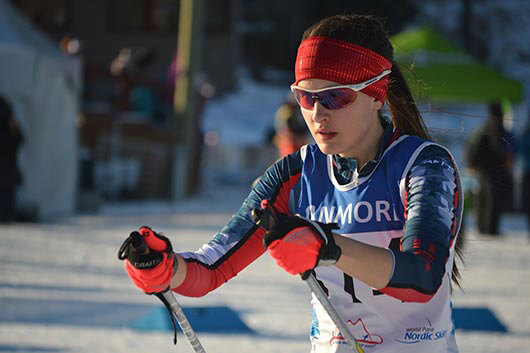March 2, 2018
A champion in the making

Freshman Nordic skier Mia Zutter will represent America in the Paralympic Winter Games
Mia Zutter’s love of athletic competition has taken her from the ice skating rinks of her hometown of Sun Prairie, WI, to the awe-inspiring scenery of Montana’s cross-country ski trails, and she’s now poised to compete on a world stage at the 2018 Paralympic Winter Games in South Korea.
An 18-year-old St. Scholastica freshman and Nordic skiing phenom, Zutter was diagnosed at age 12 with Stargardt Disease, a form of juvenile macular degeneration.
“It doesn’t define me, but it has given me so much,” she said. “Without my vision loss, I wouldn’t have found skiing at all.”
Zutter believes her eyesight has stabilized for the moment. She describes her central vision as like looking through sea glass; she can see light, shapes and movement. Her peripheral vision is better, but blurry. She can get around by herself, using a cane only for particularly crowded situations. For her schoolwork, she uses an iPad to read magnified scans of her textbook pages. She’s majoring in psychology and is interested in sports or school psychology.
But that’s all on hold for the moment, as she spends the next few weeks in Pyeongchang, South Korea, representing the United States at the 2018 Paralympic Winter Games.
From skating to skiing
Her journey to the heights of Nordic ski competition actually began on an ice skating rink. She’d always loved figure skating, a hobby she shared with her older sister. But as her eyesight deteriorated, it became evident that she needed a different athletic outlet. She started running track, with her sister as her guide. They ran hooked at the wrist. Her favorite event was the mile run, and she eventually moved into cross-country running.
“I was better at longer distances. I didn’t plan on being a distance runner; it just kind of happened,” Zutter said.
During her sophomore year in high school, a representative from the Central Cross Country Ski Association reached out to see if she was interested in trying Nordic skiing. Once she tried roller skiing, a dry-land training method that skiers use in the off-season, she was hooked. A Thanksgiving trip to West Yellowstone, MT, for an on-snow camp sealed the deal. A new cross-country skier was born.
Zutter’s outstanding athleticism continued to attract the attention of talent scouts, and by the time she was a senior in high school, she had competed in a World Cup event in Germany and a pre-Paralympic event in South Korea.
She races other athletes who are visually impaired. They’re categorized based on their level of eyesight. Zutter is classified as a B-3, but if her vision worsens she might later become a B-2. B-1 athletes are fully blind.
Zutter skis with a guide who isn’t physically connected to her. The guide skis ahead of her wearing a microphone with a speaker on his or her back, and calls out directions.
“I’m kind of on my own, which I like because it feels like I’m doing it myself more,” she said.
A great fit at St. Scholastica
As her high school graduation approached, Zutter considered taking time off to prepare for the 2018 Paralympics instead of starting college. Her teammates talked her out of it.
“Being on a college team is the best training you can get,” she said.
Though she had a few other colleges in mind, a conversation with Nordic Ski Coach Maria Stuber and a visit to the Duluth campus convinced her to become a Saint.
“Look at this school! How could I not come here?” Zutter said. “And Duluth is amazing, and there’s a guarantee of snow. So I decided to come here. I’m so glad I did.”
Stuber and cross-country running coach Chad Salmela developed a strict training plan for Zutter, with the goal of qualifying for the 2018 games. Stuber was impressed by Zutter’s progress, pointing out that it’s easy to forget just how new she really is to Nordic skiing.
“She is stubborn and determined like most great endurance athletes,” Stuber said. “She is one of the bravest athletes I’ve ever met. Mia has the potential to be incredibly good at this sport, in both the Para and NCAA divisions.”
Zutter says she’s thankful for the support she gets not only from her coaches, but from her professors, academic support staff members, and the Center for Equal Access. The office focuses on furthering the education, understanding, and promotion of students with disabilities.
“They’re willing to problem-solve for your unique situation,” Zutter said.
Melissa Watschke, director of the Center for Equal Access, said Zutter is engaged, independent and a great advocate.
When Zutter has to miss class time to travel for competitions, her professors are flexible and supportive, she said.
“The school realizes that there’s more to life than a career,” she said.
The road to South Korea
Zutter qualified for the U.S. Paralympic Team with an outstanding performance at an event in Canmore, Canada, in December.
“I just raced out of this world,” she said. “I felt kind of like an old pro.”
The Paralympic Winter Games start on March 8, and Zutter is slated to compete in a 15K skate ski, a 7.5K classic ski and a 1.5K classic sprint. She might be a part of a relay team, too.
It’s an extraordinary milestone for a young athlete who has already achieved a great deal in a very short time.
“She’s never skied with perfect vision; it’s incredible to see her compete with that in mind,” Stuber said. “I think Mia will touch the lives of every person she works with. She has the potential to inspire countless athletes to try things outside of their comfort zones, and focus on what they can do in life instead of what they can’t.”

